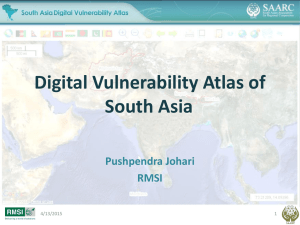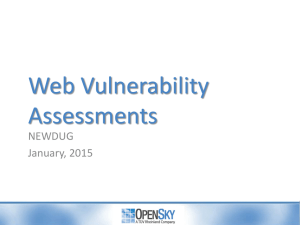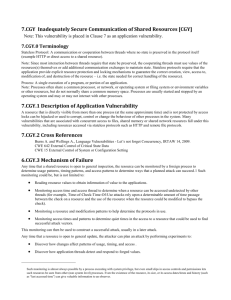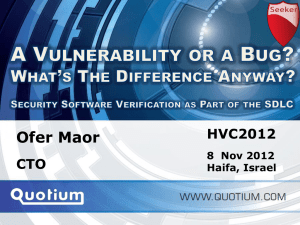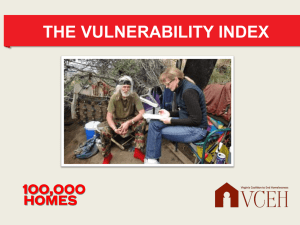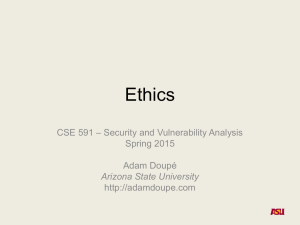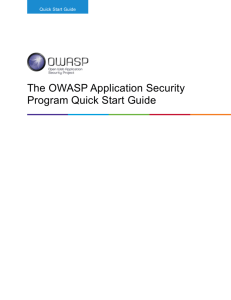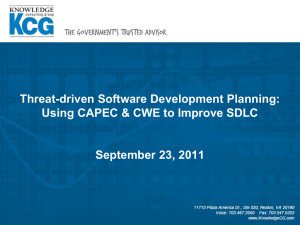05 Vulnerability assessment
advertisement
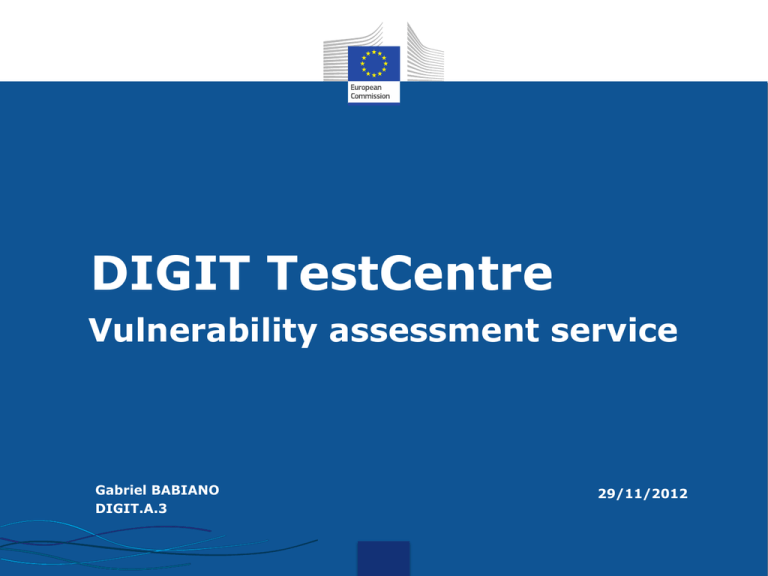
DIGIT TestCentre Vulnerability assessment service Gabriel BABIANO DIGIT.A.3 29/11/2012 I.T. Agenda • Service presentation • Lessons learned 2 DIGIT TestCentre Organizational location: Physical location: Service manager: DIGIT.A.3 DRB D3 (LUX) Gabriel BABIANO Performance testing service since 2002 (currently 6 testers) Vulnerability assessment service since 2011 (currently 3 testers) 3 DIGIT TestCentre – clients and figures •Clients •European Commission (including Executive Agencies and Services) •Other European institutions under agreement (e.g. Court of Justice of the European Union) Breakdown per DGs •Around 50 VTs per year 4 Grounds for vulnerability assessment Motivation: •Legal constraints •Reputation •Data stolen •Continuity of the service 75% cyber-attacks directed to web application layer (Gartner) Network security alone does not protect web apps!!! 5 Tests in Information Systems life-cycle 6 Cost versus life-cycle stage VT Secure coding guidelines 7 "Finding and fixing a software problem after delivery is often 100 times more expensive than finding and fixing it during the design and requirements phase" (Barry Boehm) DIGIT TC Vulnerability service deliverables •Vulnerability assessment reports (per test/iteration) • • • • Filtered potential vulnerabilities (no false positive…) Classification on criticality and prioritization Potential remediation Evolution from previous iterations •Secure coding guidelines • • • • • Best practices in secure coding Recommended languages (HTML, JAVA, ColdFusion) Aligned to threats evolution Both for developers and operational managers 1st draft release due for 01/2013 8 DIGIT VT service tests •Black Box Vulnerability Test (dynamic analysis) • • • • • Need a working application target (closest to PROD) No access to source code required Not specific to coding language(s) Automatic tools + manual testing to supplement the tools Complement to Penetration Testing and WBVT • White Box Vulnerability Tests (static analysis) • • • • • Access to buildable source code Automatic tools + manual revision to avoid false positives All recommended languages are supported (Java, CF…) No absolute need for application target but it helps a lot Detects more vulnerabilities than black box 9 DIGIT TestCentre service procedure workflow Several iterations are normally required 10 DIGIT TC Vulnerability service tools •Static code analysis (SAST) •Automatic tools •Manual code review: •Eclipse •Dynamic program analysis (DAST) •Automatic tools •Manual tools: •Firefox and plugins: •Tamper Data •Database tools 11 Tools evaluation - methodology 12 Tools evaluation – criteria 13 Tools evaluation – critical metrics Correctness of the results Accurate Minimum false positive Minimum inconclusive Minimum duplicates Completeness of the results % detected % missed False negatives Misnamed Performance Scan duration 14 Tools lists •Static code analysis (SAST) http://en.wikipedia.org/wiki/List_of_tools_for_static_code_analysis https://www.owasp.org/index.php/Source_Code_Analysis_Tools •Dynamic program analysis (DAST) http://en.wikipedia.org/wiki/Dynamic_program_analysis •Open source DAST tools: • • • • • • WebScarab Nikto / Wikto Open Web Application Security Project (OWASP) Google ratproxy and skipfish W3af Websecurify 15 Costs per test In-house service: Assumption: complete VTs (WB & BB) takes 10 working days in average (15 tests per tester per year) Strong investment in licenses the first year Costs are similar after the th 4 year Security skilled tester with an "industrialized" procedure required Outsourced service: No requires investment Less flexible for the development? Quality? Iterations? 16 Engineering for attacks 17 Vulnerability risk areas Security controls Security functions 18 OWASP Top Ten (2010 Edition) http://www.owasp.org/index.php/Top_10 19 20 21 2011 CWE Top 25 Most Dangerous Software Errors 22 http://cwe.mitre.org/top25/ Comparison OWASP Top Ten 2010 – CWE Top 25 2011 http://cwe.mitre.org/top25/ 23 DIGIT TestCentre Priorities are adapted for every application Score = Risk * Impact 24 Vulnerability assessment • Assess and secure all parts individually • The idea is to force an attacker to penetrate several defence layers • As a general rule, data stored in databases are considered as "untrusted" "In God we trust, for the rest, we test" 25 Vulnerability remediation priorities Recommendations for remediation are founded in the report Cover high priority first. Then others when “affordable” Begin with risky vulnerabilities that are easy to remediate 26 Vulnerabilities type occurrence in the 1st iteration (%) 100% 90% 80% 70% 60% 50% 40% 30% 20% 10% 0% http://cwe.mitre.org/top25/ http://projects.webappsec.org/w/page/13246989/Web%20Application%20Security%20Statistics 27 Improvements in Design and Coding stages Iteration Vulnerability group Cross-Site Scripting Injection Insecure Transmission of credentials/tokens Password Management Cookie Security Path Manipulation Weak authentication Open redirect Logging of credentials Cross-Site Request Forgery Header Manipulation Weak cryptography File Upload Forced Browsing Log Forging Information disclosure 1 43 23 2 14 6 10 13 9 3 4 5 2 16 15 14 8 7 6 4 3 6 7 2 2 28 1 4 3 2 3 2 1 3 3 2 1 4 2 5 1 1 6 1 2 Flaws can appear in future iterations 1 1 1 1 1 1 1 1 security increases 1 in every iteration 1 1 2 Threats to the VT success • • • • • Tested source code not the same as PROD Testing environment differs from PROD Vulnerability testing tools can’t cover all automatically Hacking techniques faster than service coverage If necessary, penetration tests are conducted by a 3rd party 100% risks & vulnerability-free cannot be guaranteed and security is not only a secure source code… 29 Some references • Open Web Application Security Project (OWASP): www.owasp.org • Web Application Security Consortium (WASC): www.webappsec.org • Common Vulnerability Scoring System (CWSS): http://www.first.org/cvss/ • Common Weakness Enumeration (CWE): http://cwe.mitre.org • Common Attack Pattern Enumeration and Classification (CAPEC): http://capec.mitre.org/ • SANS Institute: www.sans.org 30 Questions? 31 Thank you! 32
